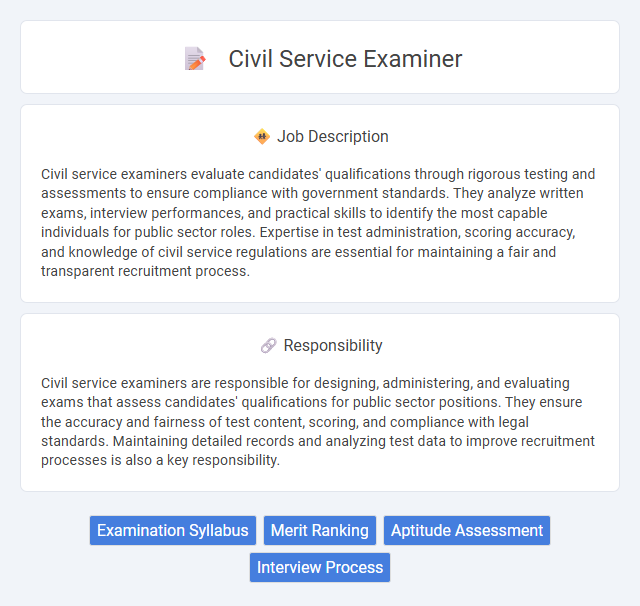
Civil service examiners evaluate candidates' qualifications through rigorous testing and assessments to ensure compliance with government standards. They analyze written exams, interview performances, and practical skills to identify the most capable individuals for public sector roles. Expertise in test administration, scoring accuracy, and knowledge of civil service regulations are essential for maintaining a fair and transparent recruitment process.
Individuals who possess strong analytical skills, attention to detail, and an interest in governmental procedures are likely to be well-suited for a civil service examiner position. The role may particularly appeal to those who thrive in structured environments and are comfortable evaluating the qualifications of candidates under standardized criteria. Those with a preference for dynamic, fast-paced settings might find this role less compatible with their work style.
Qualification
A Civil Service Examiner typically requires a bachelor's degree in public administration, political science, or a related field to ensure strong foundational knowledge of government operations and policies. Relevant experience in administrative testing, personnel assessment, or public sector recruitment enhances qualifications, along with proficiency in data analysis and examination software. Certification in human resources or testing and evaluation is often preferred to demonstrate expertise in standardized exam administration and candidate evaluation processes.
Responsibility
Civil service examiners are responsible for designing, administering, and evaluating exams that assess candidates' qualifications for public sector positions. They ensure the accuracy and fairness of test content, scoring, and compliance with legal standards. Maintaining detailed records and analyzing test data to improve recruitment processes is also a key responsibility.
Benefit
Civil service examiner jobs likely offer stable employment with competitive salaries and comprehensive benefits, including health insurance and retirement plans. Opportunities for career advancement and professional development may be available, contributing to long-term job security. The role might also provide a structured work environment with regular hours, supporting work-life balance.
Challenge
A civil service examiner job likely involves navigating complex regulatory frameworks and ensuring fair evaluation processes, which may present continuous challenges related to maintaining objectivity and handling high volumes of applicants. Managing stress and upholding strict confidentiality are also probable obstacles that require strong ethical standards and resilience. The role might frequently demand adapting to evolving policies and technological advancements, impacting exam administration and assessment accuracy.
Career Advancement
A Civil Service Examiner plays a crucial role in evaluating candidates for government positions through rigorous testing and assessments. Career advancement opportunities often include progressing to senior examiner roles, specializing in test development, or transitioning into human resources and administrative management within various public sector agencies. Mastery of examination design, analytical skills, and in-depth knowledge of civil service regulations enhances prospects for promotion and leadership positions.
Key Terms
Examination Syllabus
The Civil Service Examiner job requires a deep understanding of the examination syllabus, which typically includes topics such as General Studies, English Language Proficiency, Reasoning Ability, Quantitative Aptitude, and Optional Subjects based on the candidate's chosen stream. The syllabus covers a comprehensive range of subjects including history, geography, polity, economics, environmental science, and current affairs, ensuring a well-rounded assessment of candidates' knowledge. Mastery of this syllabus enables examiners to design fair, rigorous question papers that align with the prescribed guidelines and evaluate candidates effectively.
Merit Ranking
Civil service examiners evaluate candidates based on merit ranking systems that assess qualifications, experience, and examination scores to ensure fair and transparent hiring processes. Merit ranking helps identify the most qualified applicants by prioritizing objective criteria such as test performance, education level, and relevant work history. This process supports equitable recruitment, promoting efficiency and competence within public sector roles.
Aptitude Assessment
The Civil Service Examiner job primarily involves conducting aptitude assessments to evaluate candidates' reasoning, problem-solving, and analytical skills essential for government roles. These assessments measure verbal, numerical, and logical reasoning abilities to ensure candidates meet the competency standards required for public service positions. Effective aptitude evaluation helps select qualified individuals for various civil service exams, enhancing workforce efficiency and public administration quality.
Interview Process
The civil service examiner interview process typically involves multiple stages, including a structured competency-based interview to assess candidates' knowledge, aptitude, and suitability for government roles. Candidates may face scenario-based questions designed to evaluate problem-solving skills, ethical judgment, and understanding of public administration principles. Preparation for the interview requires familiarity with relevant laws, regulations, and organizational policies essential to effective civil service performance.
 kuljobs.com
kuljobs.com